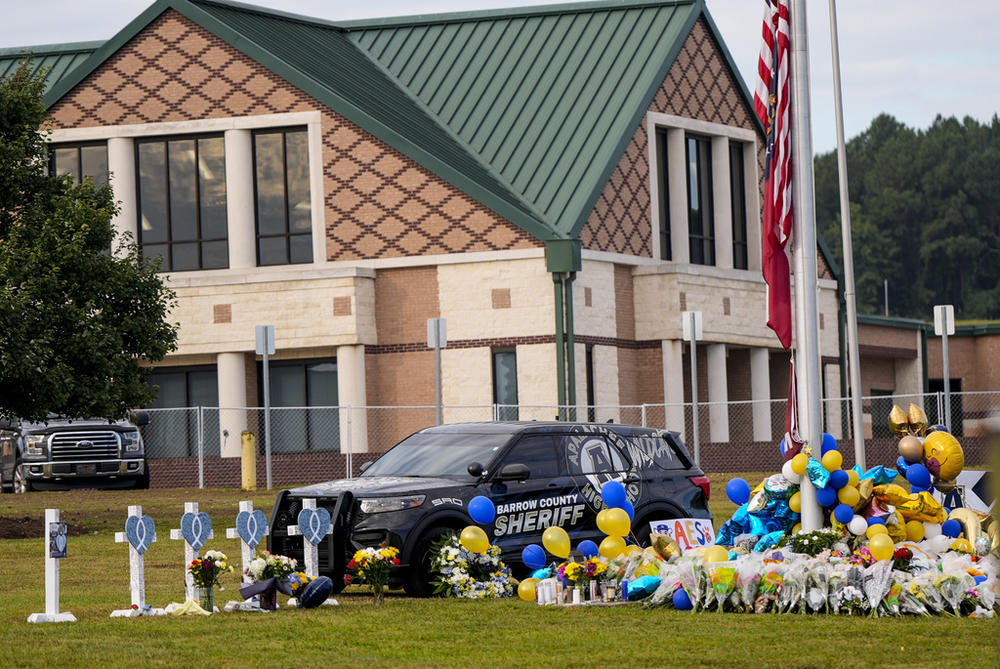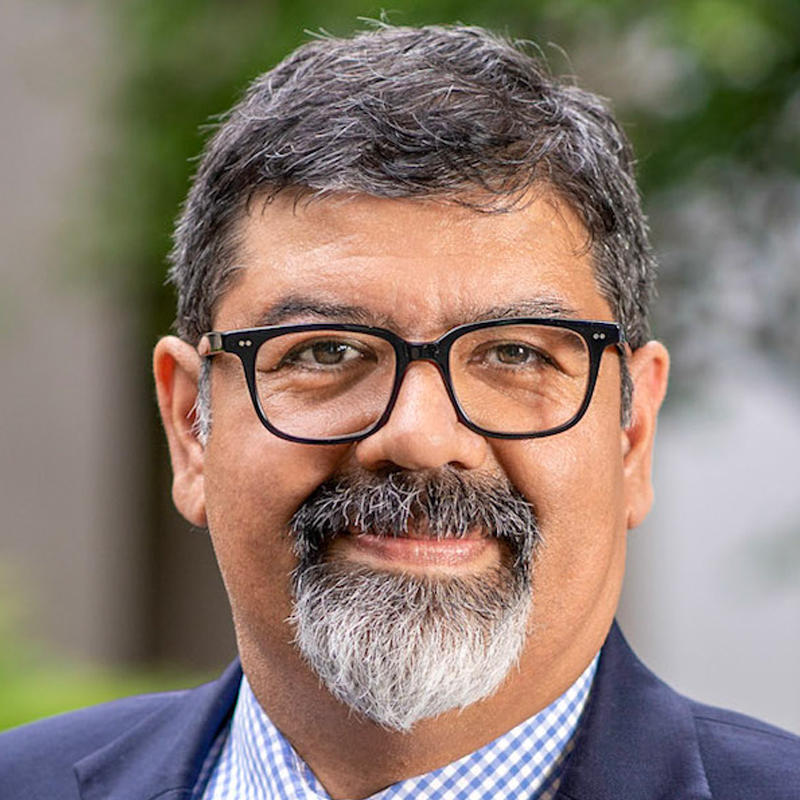
Caption
A memorial is seen at Apalachee High School after the Wednesday school shooting, Saturday, Sept. 7, 2024, in Winder, Ga.
Credit: AP Photo/Mike Stewart
Emory University School of Law professor John Acevedo answers thorny legal questions coming out of the shooting in Winder. GPB's Orlando Montoya talks with Acevedo about it.

A memorial is seen at Apalachee High School after the Wednesday school shooting, Saturday, Sept. 7, 2024, in Winder, Ga.
Details continue to emerge about the Sept. 4 killing of two students and two teachers at Apalachee High School.
Records released Friday by Barrow County show that its emergency call center was overwhelmed by calls about the shooting.
Earlier in the week, investigators said the alleged gunman, 14-year-old Colt Gray, carried a semi-automatic assault weapon to school hidden in his backpack.
He's been charged as as an adult with four counts of murder.
Authorities also have charged his father, Colin Gray, with murder and other crimes based on "gross negligence."
It's only the second time in the U.S. that such charges have been made against a parent. The first time was in Michigan, where a school shooter's parent was sentenced to 10 years in prison earlier this year.
The cases raise legal questions about parental responsibility, gun laws and other issues. GPB's Orlando Montoya discussed some of those issues with professor John Acevedo of Emory University School of Law.

Emory University School of Law professor John Acevedo calls the Apalachee High School shooting prosecution, and a similar case in Michigan, a 'leap forward' in American law.
Orlando Montoya: Mr. Acevedo, it's a well-established principle that sons are not responsible for the sins of their father. How is the father in this case responsible, allegedly, for the sins of the son?
John Acevedo: Yeah, that's quite an interesting point to raise. We generally don't like liability, tort liability or especially criminal liability for the actions of the others. I think what makes these two cases stand out a bit is that both in Michigan and here in Georgia, the parents actually gave the guns to the eventual shooter.
Orlando Montoya: Is there a law against that?
John Acevedo: So it's interesting. And I think this is what really makes it a fascinating case. There really is no law we can point to that the parent broke. Georgia does not have a secure firearms law. The Second Amendment also allows you to give guns to persons of almost any age. But there's been a long-standing rule in criminal law that you cannot aid and abet a crime. And now the issue becomes, how much knowledge does a parent need to have had that the child might do something like the school shooting to be criminally liable? And that's going to be very fascinating to see. The grand jury may not hold those charges or find a "true bill," as the phrase goes, that is, that they should go forward. And, of course, a 12-person jury may not convict this father. So as we very fascinating as we go forward to see if folks have the stomach to hold parents liable.
Orlando Montoya: You said there's no law that the parents broke. So, what law is the father actually charged with?
John Acevedo: So it's interesting. To clarify, what I meant was, we don't have a law that says it's illegal to give a minor a gun or it's illegal to not secure your guns so that a minor individual can't get hold of them. But we do have a law in Georgia on the books that says if you act in a negligent manner, you can be charged with the deaths that occur from that. So I think the best analogy for your listeners is: Imagine if a parent gave a minor child, a 14-year-old, alcohol and the keys to the car and the child then tried to drive and hit a bicyclist or a pedestrian. We would probably charge that father with negligent homicide. They gave the alcohol and the car keys to a 14-year-old. This is similar to that. You gave the gun to a 14-year-old who you — again, according to the claim, this hasn't been proven yet — but, who the DA claims was known to be unstable and fascinated with guns. So that's the idea. That's always been a crime: that negligence in behavior.
Orlando Montoya: I want to go back to the interaction in 2023 between the police, the father and the son. The police visited their house and questioned them about alleged threats to the school. What's the legal standard by which the police could have intervened at that time?
John Acevedo: So this was threats made against the son's middle school. It was suspected it was made by Colt Gray. And the standard ... would have been probable cause. So the police needed probable cause that he made the threats to the school. And they clearly didn't have it or they would have arrested him or charged him and nothing became of that. So they really lacked that probable cause. And probable cause is fairly low. It's beyond mere suspicion. That is, you have some factual basis and they couldn't find factual basis. He denied it. It was made on the internet anonymously. They couldn't tie the account to him, and therefore there really was nothing they could go on.
Orlando Montoya: How far could the legal system take parental responsibility? I can think of drug offenses, any number of crimes that you could hold parents accountable for. Does this apply to all crimes or just big, heinous crimes like these two: the school shootings we've been talking about in Michigan and Georgia?
John Acevedo: We have seen parents charged in drug deaths, in alcohol-related deaths. So in many ways, it's a revival. A lot of these cases were back in the '80s and '90s where parents had gave birth to children who were addicted to drugs or where parents who dig drugs, their children got hold of them and then died. So we've seen these types of cases before, just never with guns. And I think that's the big step. We're moving up from items that the parents are intentionally giving the children which are known to cause harm, to a gun, which, if used responsibly, won't cause harm. You can imagine most children who own guns use them for hunting, target practice and, you know, never really go shooting anyone. When there's mass shootings, they're shocking because they're so rare. We feel like they're occurring every day. And they may occurring more frequently than we want. But if we look at your average gun owner, your average gun owner isn't killing people. And I think that's the leap forward here. ... As opposed to cocaine or heroin, for example, which tends to kill a lot of people.
Orlando Montoya: And is it legal for children to own guns?
John Acevedo: It is. So it depends on the state. In most states, the child will not be the official title holder of the gun. The parent will be. And it's going to depend on the type of gun. So, for example, blackpowder guns tend to be unregulated. Anyone who's been in the the Boy Scouts, you tend to learn on blackpowder or .22s. And that's because those can be possessed easily by children. Shotguns in most states are not regulated as well. They're sold at Walmart. The shotgun, we don't really track the serial numbers of those. Suns like ARs and handguns — not blackpowder, but regular bullet handguns — those we track. And those you'll see, it's a huge kind of mess of laws across states and jurisdictions. Some states will allow children at 14 to own guns, some at 16, some at 18 at adulthood. So it really varies by state and it causes mass confusion for that. And it will be interesting to see how that plays into the jurors' minds. In many ways, we can think of the Rust case, where gun owners were far more offended by the actions of Alec Baldwin than non-gun owners. Because, for a gun owner, you kind of were taught very early on: You don't aim a gun at someone and pull the trigger. You really should never do it. But if you're going to, you need to personally make sure that it is not loaded, which he failed to do. And similarly, in Michigan, a lot of the folks who were in favor of the prosecution were actually gun owners who felt these parents acted irresponsibly and were giving all gun owners kind of a bad name. So it will be very interesting to see how this plays out in Georgia as we go forward.
Orlando Montoya: Okay. Well, John Acevedo, thank you very much. I appreciate your time.
John Acevedo: Thank you. Have a wonderful day.